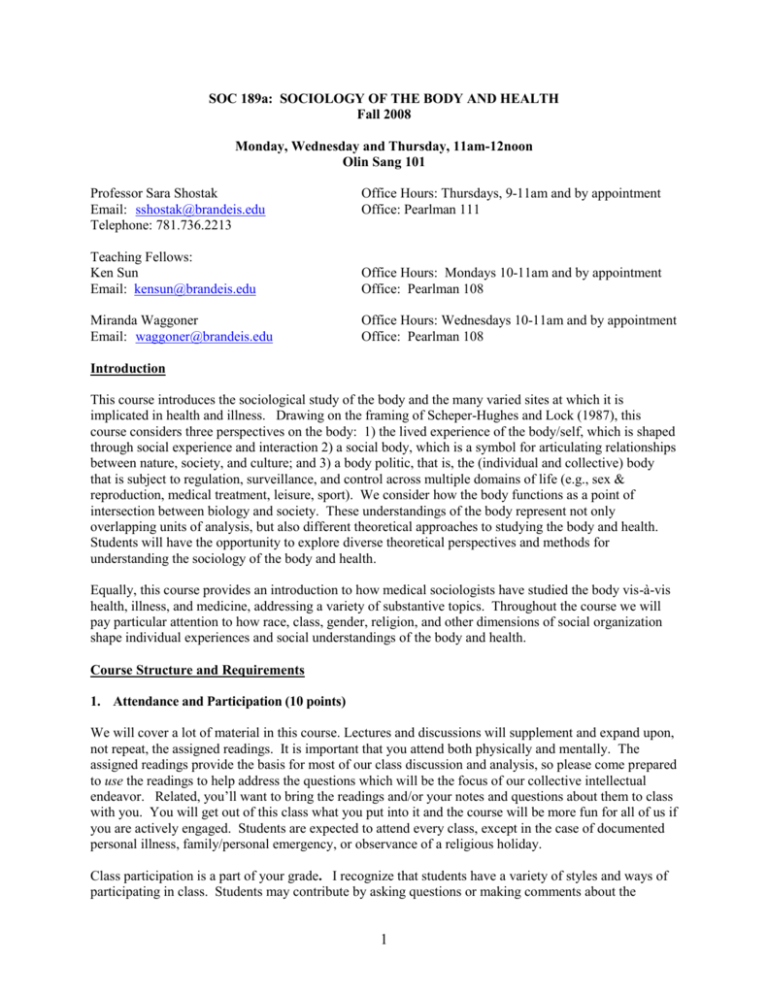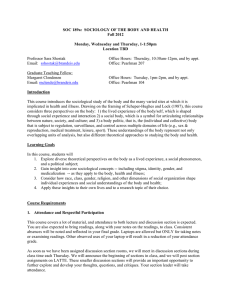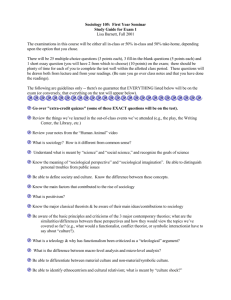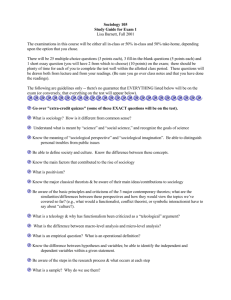SOC 189a: SOCIOLOGY OF THE BODY AND HEALTH
advertisement

SOC 189a: SOCIOLOGY OF THE BODY AND HEALTH Fall 2008 Monday, Wednesday and Thursday, 11am-12noon Olin Sang 101 Professor Sara Shostak Email: sshostak@brandeis.edu Telephone: 781.736.2213 Office Hours: Thursdays, 9-11am and by appointment Office: Pearlman 111 Teaching Fellows: Ken Sun Email: kensun@brandeis.edu Office Hours: Mondays 10-11am and by appointment Office: Pearlman 108 Miranda Waggoner Email: waggoner@brandeis.edu Office Hours: Wednesdays 10-11am and by appointment Office: Pearlman 108 Introduction This course introduces the sociological study of the body and the many varied sites at which it is implicated in health and illness. Drawing on the framing of Scheper-Hughes and Lock (1987), this course considers three perspectives on the body: 1) the lived experience of the body/self, which is shaped through social experience and interaction 2) a social body, which is a symbol for articulating relationships between nature, society, and culture; and 3) a body politic, that is, the (individual and collective) body that is subject to regulation, surveillance, and control across multiple domains of life (e.g., sex & reproduction, medical treatment, leisure, sport). We consider how the body functions as a point of intersection between biology and society. These understandings of the body represent not only overlapping units of analysis, but also different theoretical approaches to studying the body and health. Students will have the opportunity to explore diverse theoretical perspectives and methods for understanding the sociology of the body and health. Equally, this course provides an introduction to how medical sociologists have studied the body vis-à-vis health, illness, and medicine, addressing a variety of substantive topics. Throughout the course we will pay particular attention to how race, class, gender, religion, and other dimensions of social organization shape individual experiences and social understandings of the body and health. Course Structure and Requirements 1. Attendance and Participation (10 points) We will cover a lot of material in this course. Lectures and discussions will supplement and expand upon, not repeat, the assigned readings. It is important that you attend both physically and mentally. The assigned readings provide the basis for most of our class discussion and analysis, so please come prepared to use the readings to help address the questions which will be the focus of our collective intellectual endeavor. Related, you’ll want to bring the readings and/or your notes and questions about them to class with you. You will get out of this class what you put into it and the course will be more fun for all of us if you are actively engaged. Students are expected to attend every class, except in the case of documented personal illness, family/personal emergency, or observance of a religious holiday. Class participation is a part of your grade. I recognize that students have a variety of styles and ways of participating in class. Students may contribute by asking questions or making comments about the 1 reading assignments and topics; posting newspaper or Internet articles of interest to the course LATTE site, and; contributing to discussion sections. Beginning with Week 4, we will meet in discussion sections during class time each Thursday. The first section meeting will be on Thursday, September 18. Your section assignment and location will be announced (and posted on LATTE) by Monday, September 15. These smaller discussion sections will provide a fuller opportunity to contribute your thoughts, questions, and critiques. Participation is especially important here and your section leader will take attendance. I expect that you will be respectful of others in class. Examples include arriving on time, not leaving early, listening when others speak, not monopolizing discussion time, and not having side-discussions. Please turn cell phones and pagers off. 2. Response Papers (30 points) During the semester, you must complete 10 response papers (~2pp.) which address the week’s readings. You may select which weeks you turn in a response paper and on which day you turn in your response paper; however, you must always turn in the paper by the last class meeting of a given week for it to “count” for that week. You may not complete more than one response paper per week. Your response papers should be approximately 2 pages long. In each paper, please first briefly summarize the key point or theme of the reading(s), in your own words, as you understood it (no more than half a page). Following, you may make connections to other readings, provide a critique, or raise questions or points for clarification. You will get full credit for each response paper that meets these criteria and is turned in on time. Once we begin meeting in sections, please turn your paper in to whoever leads the discussion section to which you’ve been assigned. Prior, you may turn your paper in to any of the course instructors. 4. Observation Paper (15 points) -- Due October 6 Select a public setting where you can easily conduct observation. This may be a residence hall, dining hall, grocery store, fast food restaurant, mall, café, hair salon, gym, lobby of a theatre, religious service, sporting event, etc. Spend ~60 minutes in this setting watching people in this place and take notes on what you see. Write 5 pages reflecting on your observations, addressing the following questions: - How do the activities that happen in this place involve the body? Are there any body rituals evident in this location? Are there any ways in which the activities you observe contribute to health and/or illness? - In what ways does the body enter into social interactions in this place? In what ways, if any, do people express their identities in/on/through their bodies or bodily practices in this setting? Do physical similarities and differences seem to matter in any particular ways here? - Are there any representations of the body and health here (posters, advertisements, etc.)? What is the story that they tell? In what ways, if any, do these representations shape the experience of being in this place? - Be sure to use at least three of the class readings to support your analysis of this setting. Provide citations for these readings. Note: if the place you have selected for observation does not allow you to answer these questions, you will have to conduct observation at another location. 2 5. Media Analysis Paper (15 points) -- Due November 13 From either a print or online source (such as Lexis Nexis or from an archive of the site), find an article from a major newspaper (eg. New York Times, Boston Globe, Washington Post, Chicago Tribune, or San Francisco Chronicle) or from a major news magazine (eg. Newsweek, Time, U.S. News and World Report). Cut out, photocopy, or print the article, including any photographs, diagrams, or other graphics which accompany it. Write a 5 page paper addressing the following questions: - Identify and briefly describe the physical condition, illness, or health problem you have chosen. If there are population groups most affected by this illness, physical condition or health status, please describe this group (or groups). - What are the biological factors that are important to understanding this condition or health status? - What are the social factors or social processes that are important to understanding this condition of health status? - In what ways, if any, do people with this condition (and/or their family members) interact with the health care system? What other social institutions, if any, are important to the experience of living with this condition? - If you were to rewrite this article, what changes would you make? Are there any things that you would add, subtract, or emphasize differently? - Be sure to use at least three of the class readings to support your analysis of this setting. Provide citations for these readings. Be sure to turn in the article with your paper. Note: if the article you first choose does not allow you to answer the questions below, you’ll need to choose another article. 6. Final Essay (30 points) –due December 15 (before noon). During the final week of the semester, I will distribute a broad essay question designed to tie together key sets of ideas about the sociology of the body and health. You will need to hand in your response by noon on Monday, December 15. Late exams will not be accepted and will receive no credit. Policies for Written Work All written papers are to be typed, double-spaced, using a 11-12-pt. Times New Roman font, 1 inch margins, and must include page numbers, proper use of citations, and bibliographies. I place a high premium on careful research and clear organization and writing. We will spend time in class talking about how to do each of these assignments. Papers may not be re-written. This means you should offer your best effort the first time and ask questions if you need clarification before completing any of the assignments. I encourage you to use the Writing Center as you work on your papers. Written assignments are due at the beginning of class and the final essay is due on or before noon on December 15, 2008. I will NOT accept your assignments through e-mail. I only accept hard copies. If you have an emergency and are unable to complete an assignment, you must speak with me as soon as possible so we can discuss how you will complete the assignment. Do not assume that you may hand in all of your assignments at the end of the course, or that you will be granted an extension. You will lose one full letter grade for each 24 hours after the due date the assignment is turned in (i.e. if you would have received an A but your paper is turned in within the first 24 hours after it is due, you will receive a B, etc.). Documented personal illness and personal/family emergencies constitute the only acceptable grounds for late papers. 3 Assignments and Weight in Determining Grades Grades will be computed on the following basis: Attendance and Class Participation 10% Response papers 30% Observation Paper 15% Media Analysis Paper 15% Final Essay 30% Final grades will be calculated using the following distribution: 94-99 A 74-76 C 90-93 A70-73 C87-89 B+ 67-69 D+ 84-86 B 64-66 D 80-83 B60-63 D77-79 C+ <63 F I do not grade on a curve and do not give extra credit assignments. All written exercises must be completed to receive a passing grade in this class. Academic Integrity You are expected to be familiar with and to follow the University’s policies on academic integrity (see http://www.brandeis.edu/studentlife/sdje/ai/). . I will refer any suspected instances of alleged dishonesty to the Office of Student Development and Conduct. Instances of academic dishonesty may result in sanctions including but not limited to failure in the course, failure on the assignment in question, suspension from the University and/or educational programs. Reasonable Accommodations If you are a student who has academic accommodations because of a documented disability, please contact me and give me a copy of your letter of accommodation in the first two weeks of the semester. If you have questions about documenting a disability, please contact Beth Rodgers-Kay in the Undergraduate Academic Affairs Office (x63470, brodgers@brandeis.edu). Books available at the campus bookstore and on reserve at the library Brumberg, Joan Jacobs. 1997. The Body Project: An Intimate History of American Girls. New York: Vintage Books. Critser, Greg. 2003. Fat Land: How Americans Became the Fattest People in the World. New York: Houghton Mifflin. Gimlin, Debra. 2002. Body Work: Beauty and Self-Image in American Culture. Berkeley, CA: University of California Press. Groce, Nora Ellen. 2005 [1985]. Everyone Here Spoke Sign Language: Hereditary Deafness on Martha’s Vineyard. Cambridge, MA: Harvard University Press. Preves, Sharon. 2003. Intersex & Identity: The Contested Self. New Jersey: Rutgers University Press. All other readings will be posted on Latte. 4 Schedule of Sessions and Assigned Readings Week 1 August 30 Week 2 Introduction Overview and Introductions Theorizing Bodies I September 1 NO CLASS September 3 Miner, Horace. 1956. "Body Ritual among the Nacirema.” The American Anthropologist 58: 503-507. Available at URL: http://oak.cats.ohiou.edu/~thompsoc/Body.html Martin, Emily. 1991. The Egg and the Sperm: How Science Has Constructed a Romance Based on Stereotypical Male-Female Roles. Signs 16 (3): 485-501. September 4 Scheper-Hughes, Nancy and Margaret M. Lock. 1987. The Mindful Body: A Prolegomenon to Future Work in Medical Anthropology. Medical Anthropology Quarterly 1:6-41. Grosz, E. Refiguring Bodies. 2005. Pp. 43-47 in The Body: A Reader. Miriam Fraser and Monica Greco (Ed.) New York: Routledge. Week 3 September 8 Theorizing Bodies II Conrad, Peter. 1992. Medicalization and Social Control. Annual Review of Sociology 18: 209-32. Becker, Gay and Robert Nachtigall. 1992. Eager for Medicalisation: The Social Production of Infertility as a Disease. Sociology of Health & Illness 14 (4) 456471. September 10 Goffman, E. 1963. Stigma: Notes on the Management of Spoiled Identity. New York: Touchstone Press. Chapter 1 ( p. 1-40) September 11 Nettleton, Sarah. 1994. Inventing Mouths: Disciplinary Power and Dentistry. Pp. 73-88 in Colin Jones and Roy Porter, eds. Reassessing Foucault: Power, Medicine and the Body. London: Routledge. Week 4 Body, Self, and Identity – Body Projects September 15 Brumberg, Joan Jacobs. 1997. The Body Project: An Intimate History of American Girls. New York: Vintage Books. Introduction & Chapter 1 September 17 Brumberg, Joan Jacobs. 1997. The Body Project: An Intimate History of American Girls. New York: Vintage Books. Chapters 3 & 4 5 September 18 Craig, Maxine Leeds. 2002. Ain’t I a Beauty Queen? Black Women, Beauty, and the Politics of Race. Oxford: Oxford University Press. Chapters 1&2 Short Film: “A Girl Like Me” Available at URL: http://www.mediathatmattersfest.org/6/a_girl_like_me/ Week 5 Body, Self, and Identity -- Body Work September 22 Gimlin, Debra. 2002. Body Work: Beauty and Self-Image in American Culture. Berkeley, CA: University of California Press. Introduction, Chapters 1-3 September 24 Gimlin, Debra. 2002. Body Work: Beauty and Self-Image in American Culture. Berkeley, CA: University of California Press. Chapter 4 and Conclusion September 25 Harrison G. Jr., Katharine A. Phillips and Roberto Olivardia. 2000. The Adonis Complex: The Secret Crisis of Male Body Obsession. New York: The Free Press. Chapter 2: The Rise of the Adonis Complex: Roots of Male Body Obsession Monaghan, Lee F. 2005. Big Handsome Men, Bears and Others: Virtual Constructions of ‘Fat Male Embodiment.’ Body and Society 11(2): 81–111 Week 6 & 7 Body, Self, and Identity – Medical Interventions September 29 NO CLASS October 1 NO CLASS October 2 Gilman, Sander. 2000. Making the Body Beautiful: A Cultural History of Aesthetic Surgery. Princeton, NJ: Princeton University Press. Chapter 3: The Racial Nose Kaw, Eugenia. 1993. Medicalization of Racial Features: Asian American Women and Cosmetic Surgery. Medical Anthropology Quarterly 7(1):74-89. October 6 LIBRARY RESEARCH SESSION **Observation Assignment Due** October 8 Gurevitch, M., et al. 2004. (Dis)embodying Gender and Sexuality in Testicular Cancer. Social Science and Medicine 58: 1597-1607 Elson, J. 2003. Hormonal Hierarchy: Hysterectomy and Stratified Stigma. Gender & Society 17 (5): 750-770. October 9 NO CLASS 6 Week 8 The Body and Medicine -- Enhancement October 13 Mamo, Laura and Jennifer Fishman. 2001. Potency in All the Right Places: Viagra as a Technology of the Gendered Body. Body & Society 7(4):13-35. October 15 Salant, Talya, and Heena Santry. 2006. Internet Marketing of Bariatric Surgery: Contemporary Trends in the Medicalization of Obesity. Social Science and Medicine 62: 2445-2457. October 16 Conrad, Peter and Deborah Potter. 2004. Human Growth Hormone and the Temptations of Biomedical Enhancement. Sociology of Health and Illness 26(2):1-32. Film (clips): “Short” Available at URL: http://www.notes.co.il/alterman/27320.asp Week 9 The Body and Medicine -- Making Sex and Gender October 20 Lawrence, Susan C. and Kae Bendixen. 1992. His and Hers: Male and Female Anatomy in Anatomy Texts for U.S. Medical Students, 1890-1989. Social Science and Medicine 35(7): 925-934. October 22 Preves, Sharon. 2003. Intersex & Identity: The Contested Self. New Jersey: Rutgers University Press. Chapter 1-3 October 23 Preves, Sharon. 2003. Intersex & Identity: The Contested Self. New Jersey: Rutgers University Press. Chapter 4-6 Short Film: “XXXY” Available at URL: http://www.isna.org/videos/xxxy Week 10 The Body Politic -- Social Construction and Social Experience of Disability October 27 Groce, Nora Ellen. 2005 [1985] Everyone Here Spoke Sign Language: Hereditary Deafness on Martha’s Vineyard. Cambridge, MA: Harvard University Press. Chapters 1-4 October 29 Groce, Nora Ellen. 2005 [1985] Everyone Here Spoke Sign Language: Hereditary Deafness on Martha’s Vineyard. Cambridge, MA: Harvard University Press. Chapters 5-8 October 30 Film: “Sound and Fury” 7 Weeks 11 November 3 The Body Politic -- (Re)producing a Healthy Nation Rapp, Rayna. 1998. Refusing Prenatal Diagnosis: The Meanings of Bioscience in a Multicultural World. Science, Technology and Human Values 23(1):45-70. Parens, Erik and Adrienne Asch. 2003. Disability Rights Critique of Prenatal Genetic Testing: Reflections and Recommendations. Mental Retardation and Developmental Disabilities Research Reviews 9: 40-47. November 5 Wolf, Joan B. 2007. Is Breast Really Best? Risk and Total Motherhood in the National Breastfeeding Awareness Campaign. Journal of Health Politics, Policy and Law 32(4): 595-636. Guest Lecture: Miranda Waggoner November 6 Week 12 Avishai, Orit. 2007. Managing The Lactating Body: The Breast-Feeding Project and Privileged Motherhood. Qualitative Sociology 30:135–152 The Body Politic -- Obesity in the U.S. November 10 Saguy, A. and K. Riley. 2005. Weighing Both Sides: Morality, Mortality and Framing Contests over Obesity. Journal of Health Politics, Policy, and Law 30(5): 869-921 November 12 Critser, Greg. 2003. Fat Land: How Americans Became the Fattest People in the World. New York: Houghton Mifflin. Chapters 1-3 November 13 Critser, Greg. 2003. Fat Land: How Americans Became the Fattest People in the World. New York: Houghton Mifflin. Chapters 4-7 **Media Analysis Paper Due** Week 13 Bodies in Places – Environments and Inequalities November 17 Evans G.W., and E. Kantrowitz. 2002. Socioeconomic Status and Health: The Potential Role of Environmental Risk Exposure. Annual Review of Public Health 23:303–31. November 19 Brown, P., Zavestoski, S., Luebke, T., Mandelbaum, J., McCormick, S. and B. Mayer. 2003. The Health Politics of Asthma: Environmental Justice and Collective Illness Experience in the United States. Social Science and Medicine 57:453-464 Guest Lecture: Miranda Waggoner November 20 Altman, Rebecca, Morello-Frosch, Rachel, Brody, Julia, Rudel, Ruthann, Brown, Phil and Mara Averick. (forthcoming, December 2008). Pollution Comes Home and Gets Personal: Women’s Experience of Household Toxic Exposure. Journal of Health and Social Behavior. 8 Week 14 Bodies in Motion – Embodying Resistance November 24 Pitts, Victoria. ‘Reclaiming’ the Female Body: Embodied Identity Work, Resistance and the Grotesque. Body & Society (4) 3: 67-84. November 26 Film : “Rize” Available at URL: http://video.google.com/videoplay?docid=6401727599474326174&ei=AvuySOj xIKLCqALZmLjkDA&q=rize November 27 NO CLASS Weeks 15 & 16 Future Directions December 1 Brückner, Hannah and Peter S. Bearman. 2005. After the Promise: The STD Consequences of Adolescent Virginity Pledges. Journal of Adolescent Health 36:271-278 Recommended: Bearman, Peter S. and Hannah Brückner. 2001. Promising the Future: Virginity Pledges and the Transition to First Intercourse. American Journal of Sociology 106(4): 859-912. December 3 Moore, Lisa Jean and Matthew Schmidt. 1999. On The Construction of Male Differences: Marketing Variations in Technosemen. Men & Masculinities 1(4): 339-359. Guest Lecture: Ken Sun December 4 Shostak, S., Freese, J., Link, B.G. and J.C. Phelan. (forthcoming, March 2009). The Politics of the Gene: Social Status and Beliefs about Genetics for Individual Outcomes. Social Psychology Quarterly. December 8 Conclusions, Reflections, and Next Steps (No reading) ** Final Exam Essay Question will be distributed in class** **DUE DECEMBER 15, BEFORE NOON** 9









